Shane Claiborne

THESE BOOKS ALL circle the same question: What does our faith call us to do in the face of injustice? Women Talking, the 2018 novel by Miriam Toews that kicks off this list, captures the urgency of that inquiry.
“We are wasting time ... by passing this burden, this sack of stones, from one to the next, by pushing our pain away,” says Greta, a character eager to face a great evil happening in her Mennonite colony. “We mustn’t play Hot Potato with our pain. Let’s absorb it ourselves, each of us, she says. Let’s inhale it, let’s digest it, let’s process it into fuel.”
The last 25 years have dealt us plenty of pain—the so-called war on terror, racialized police violence, white Christian nationalism, greed-accelerated climate change. These books have helped us process that pain into fuel for change.

While a number of anti-death penalty advocates rightly highlight the exonerations, Elizabeth Bruenig prefers writing about the “confessed and admittedly guilty … since we all already agree the innocent shouldn’t be put to death.”

When I opened Shane Claiborne’s new book, I rolled my eyes and sighed. Claiborne’s book, Rethinking Life: Embracing the Sacredness of Every Person, was dedicated to “all the women of faith over the centuries, the midwives of a better world, and to the two most significant women in my life—my mom, Patricia, and my wife, Katie Jo.”
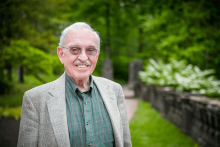
Ronald J. Sider, founder of Christians for Social Action and a stalwart evangelical advocate for social justice, died of a cardiac arrest on July 27. He was 82 years old.
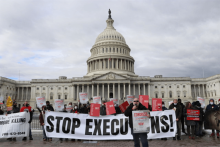
The Abolitionist Action Committee was marking the 45th anniversary of the first execution in the modern era: Gary Gilmore was executed by firing squad on Jan. 17, 1977; he had been convicted of murdering two men in Utah in 1976, and the Supreme Court ruled the death penalty legal that same year.

Lawmakers in Virginia voted on Friday to abolish the death penalty. The Democratic-led House of Delegates voted 57-41 Friday, after the Senate passed the measure earlier this week. Gov. Ralph Northam, a Democrat, said he would sign the repeal into law.

Each of the 62 men in the federal prison in Terre Haute, Ind., are quite likely guilty of horrible crimes, and those crimes should have consequences. To be anti-death-penalty is not to be anti-victim or anti-justice. To be anti-death penalty is simply to insist that we can deal with violent crime without mirroring the violence and taking another life.

Jesus on Line One
Afro-Latinx artist duendita’s EP direct line to My Creator confronts faith, doubt, and police violence against women of color in a powerful, prayerful debut. Fusing R&B, jazz, and soul, duendita conveys a striking range of emotion through rich, fluid vocals and ambient instrumentals. duendita.bandcamp.com
Spears into Pruning Hooks
Beating Guns: Hope for People Who Are Weary of Violence offers creative, Christ-centered responses to gun violence. Activist Shane Claiborne and Mennonite pastor-turned-blacksmith Michael Martin engage readers by interspersing the theology, history, and politics of guns with scripture, photos, quotes, and memorials to gun-violence victims. Brazos Press

YOU MAY REMEMBER the images of disabilities advocates arrested last year, some handcuffed in their wheelchairs, outside Senate Majority Leader Mitch McConnell’s office. Or the pastors arrested holding signs that said: “Love Thy Neighbor.” Or the waves of clergy and faith-leader arrests in Ferguson and Standing Rock, and those advocating for Dreamers and opposing tax cuts for the rich.
Maybe you heard about pastor Jarrod McKenna and Delroy Bergsma in Perth, Australia, who suspended themselves four stories above the office of Foreign Minister Julie Bishop to persuade the Australian government to act for refugees held on Manus Island without supplies. Or last year’s witness on the steps of the Supreme Court where 18 people of faith were arrested protesting the death penalty. Or the August gathering in Charlottesville, Va., where hundreds of courageous pastors, clergy, and other activists confronted the hatred of torch-bearing neo-Nazis and white supremacists.
These events aren’t about going to jail. They are about countering hatred with nonviolent love.
Civil disobedience is holy work. Gandhi called nonviolent civil disobedience “our sacred duty.” There are many ways to nonviolently resist injustice: Boycotts. Divestment. Writing op-eds. Petitions. Lobbying. Prayer vigils. Groundswell campaigns. Picket lines. Strikes. Die-ins. Sit-ins. Lock-downs. Distributing flyers on street corners. (Famously, the late political scientist Gene Sharp listed 198 methods of nonviolent direct action.)
Going to jail isn’t the only way to resist evil. But it is one way. And a very effective way, with a rich tradition for Christians. Though questions of privilege arise when it comes to risking arrest, what also surfaces is that some people have nothing to lose “but their chains,” as the chant goes. Many marginalized people have found civil disobedience to be a way to rage collectively against injustice and to stop business as usual.

We are living in a time of unprecedented economic disparity between the rich and the poor, the haves and the have-nots. Masses live in poverty so that a handful of people can live as they wish. The world’s three richest people own more than the combined economies of 48 countries. The average CEO in the US is making 400 times the average worker.
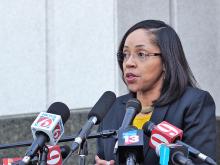
Indeed, a comprehensive analysis of deterrence studies by the National Academy of Sciences found no evidence that the death penalty impacts murder rates in either direction. Ayala emphasized that her office pursues evidence-based practices, not policies such as the death penalty whose deterrent effect rests on faith alone.
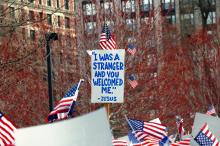
Since it was unveiled last week, President Trump’s proposed budget has been widely denounced as “immoral” and downright “evil” for boosting defense spending by billions while demanding drastic cuts to vital aid programs.
Yet if liberals and some conservatives are upset about cuts to programs that help ensure clean drinking water, give financial aid to low-income college students, and even help support Meals on Wheels — which delivers nearly a million meals a day to the sick and elderly — would Jesus have a problem with slashing assistance to the needy?
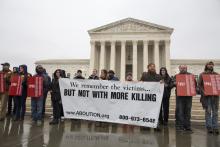
We resisted — and we still face the possibility of jail time, fines, and community service. Here are a few of the lessons I’ve learned planning events like this one over the years. I hope you can use them as you continue to resist unjust policies.

We march on Jan. 17 because it is the 40th anniversary of the first "modern-era" execution, after our courts ruled in favor of the death penalty following a decade-long moratorium. On that day, Gary Gilmore was executed by firing squad in Utah in revenge for his murders of Max Jenson and Ben Bushnell. Since then there have been 1,442 other executions. We will hold 40 signs, one for each year since 1977, with the names of those executed each year. We will also carry roses for the victims — both those who have been murdered and those who have been executed — declaring that violence is the disease … not the cure.
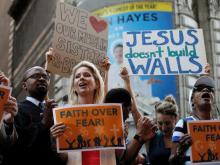
The day after the election, Lisa Sharon Harper nearly gave up the name “evangelical.”
That’s because 81 percent of white evangelical Christians voted for Donald Trump for president, a candidate she described as “representing all of the things Jesus stood against — lust for money, sex, and power.” And their vote propelled the Republican nominee to victory.

In a letter signed by 49 evangelicals from Texas and around the country, the Christian leaders said officials have a “moral obligation” to stop the execution, which is scheduled for Aug. 24.
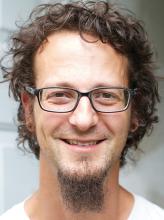
A SELF-PROCLAIMED “ordinary radical” from eastern Tennessee, Shane Claiborne is a founding member of the New Monasticism movement, which encourages a life of simplicity, nonviolence, community, and prayer. In 1997, along with fellow passionate friends from Eastern University, Shane co-founded The Simple Way—an intentional Christian community in inner-city North Philadelphia. His books include Jesus for President, Red Letter Revolution, Common Prayer, and Becoming the Answer to Our Prayers. He’s been featured in films such as Another World is Possible and Ordinary Radicals. His forthcoming book, Executing Grace, calls Christians to advocate for the abolishment of the death penalty.
Shane’s first book, The Irresistible Revolution: Living as an Ordinary Radical, quickly became a foundational text for many young, social justice-minded Christians. Now, 10 years later, he’s updating the world about what this revolution looks like today. Claiborne spoke with Sojourners editor-in-chief Jim Wallis by phone in November about what’s new—and what’s not—in his lifelong vocation to be part of the Jesus revolution.
Jim Wallis: This is the 10th anniversary of the publication of Irresistible Revolution, and you’ve just released an updated edition. What new insights can we expect in this version?
Shane Claiborne: After 20 years of living in North Philly, there are things you look back on and you think, wow, that looks different from what I thought it would. So it’s been a surprise and a gift to get to tweak the book a little bit. I wrote notes in the margins throughout the book. Some of them are fun and some of them are to be a little bit more accurate. Then I did a whole section of frequently asked questions. Those run the gambit of “How come you got married?” to “What do you do with ISIS?” I added an appendix, too, about the tradition of civil disobedience in the church. It was fun!
“The irresistible revolution,” you said in the first edition of the book, “isn’t just about going to heaven when you die, but bringing heaven down as you live. ... The revolution we are talking about begins inside each of us and extends to the ends of the earth.” Has that changed? No, I don’t think that has changed at all. What does change are the ways we live that out. When we started The Simple Way 20 years ago, there was the sense that everybody needs to leave everything behind and just live on the streets. What we’ve seen the Spirit doing is much more dynamic and spectacular than that—people are living out unique vocations. We have lawyers, doctors, plumbers, gardeners, or urban farmers—folks who are using their gifts for seeking first the kingdom of God and interrupting the patterns of injustice.

National Geographic magazine recently named Mary, the mother of Jesus, “the most powerful woman in the world” as an appraisal of her ongoing influence and popularity. But do Mary’s words and example have a prayer of being heard and effecting change in this time of war?
Indeed, this is war. America has effectively been engaged in continuous warfare since the weeks after September 11, 2001. In a few decades we’ll learn what happens when whole generations of people grow up and take charge of a society that has waged war their entire lives.
Attempts to tone down the descriptions we use for warfare or the way we conceptualize the present conflict don’t change anything. No end is in sight. Others turn up the rhetoric: after the San Bernardino shooting, at least one presidential candidate insisted the USA now finds itself in “the next world war.” Another one puffed up his chest and boasted of his resolve to “carpet bomb” people. We hear this stuff so often, we’ve become numb to its magnitude.

Only 15 women have been executed in the U.S. since the reinstatement of the death penalty in 1976. For two death penalty cases involving women to make the news in the same week is unprecedented – but it’s happening.
One is Jodi Arias, convicted of killing her ex-boyfriend in 2008, whose sentencing trial was this week. She could face the death penalty in Arizona.
The other is a lesser-known case in Georgia — Kelly Gissendaner, convicted in a 1997 Atlanta murder plot that targeted her husband. Though sentenced to death, it is clear that with a little better legal coaching, Ms. Gissendaner could have plea-bargained for her life. That’s exactly what her husband’s killer, Gregory Owens, did. And now he’s behind bars as she counts down the hours to her death. It just doesn’t feel like your life should depend on how well you play the legal cards, but it sure seems to.
Kelly Gissendaner was supposed to die Wednesday night — but there was an interruption.
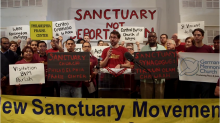
BREAKING NEWS:
There is a nonviolent uprising around immigration happening in Philadelphia and a dozen other U.S. cities. Philadelphia faith leaders announced that they will welcome immigrant families even if it is against the law. They are building a movement of "sanctuary congregations" and have dreams that the U.S. will one day be a sanctuary nation.
We join them in insisting that we must obey the laws of God over the laws of our government — and that means "welcoming the foreigner as if they were our own flesh and blood." (Exodus 22:21, Lev.19:34, etc., etc.).
Jesus says that when we welcome the stranger we welcome him. When God asks: "When I was a stranger did you welcome me?" (Mt. 25) we are not going to say: "Sorry God, Congress wouldn't let us."
We know that sometimes divine obedience can mean civil disobedience.
As St. Augustine once said: "An unjust law is no law at all."